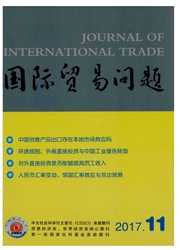

 中文摘要:
中文摘要:
在重新测度外资进入和服务业集聚指标基础上,本文利用2008年第二次全国经济普查服务业企业数据与相关城市变量,深入考察了服务业集聚对外资进入影响不同地区、不同行业服务业工资差距的调节机制。研究结果表明:外资进入和服务业集聚水平的提升总体上有利于缩小企业工资差距,通过调节变量回归分析也证实了二者的调节机制同样会缩小工资差距,且服务业集聚会调节外资进入的负向工资溢出效应;无论是高EG地区还是低EG地区,外资进入和服务业集聚对工资差距均呈现负效应,且其对缩小低EG地区工资差距的调节效应比高EG地区更为明显;生产性服务业和公共性服务业的外资进入与集聚对工资差距的影响与上述结果一致,其对缩小公共性服务业工资差距的调节效应明显强于生产性服务业.但对消费性服务业的影响并不显著。
 英文摘要:
英文摘要:
Based on the re-calculation service industry agglomeration index, this of the foreign investment index and paper uses the related city variables and the service industry companies data of the second national economic census database in 2008, to further investigate the moderating mechanism of service in- dustry agglomeration on the foreign investment's influence on different areas and different industries wage gap. The results are as follows: firstly, Foreign invest- ment and service industry agglomeration upgrade is conducive to narrowing the enterprise wage gap, and analyzing the model item contains moderating effect al- so gets the same conclusion. Service industry agglomeration negatively adjusts the wage spillover effect of foreign investment. Secondly, whether in high or low EG areas, the wage gap is negatively affected by foreign investment and service industry agglomeration. The moderating mechanism of areas wage gap narrowing effect in low EG is more obvious than high EG areas. Thirdly, the empirical re- sults of producer services and public services are consistent with the above con- clusion. The moderating mechanism on public services wage gap narrowing is ob- viously stronger than the producer services, but there is no significant difference among consumer services.
 同期刊论文项目
同期刊论文项目
 同项目期刊论文
同项目期刊论文
 期刊信息
期刊信息
